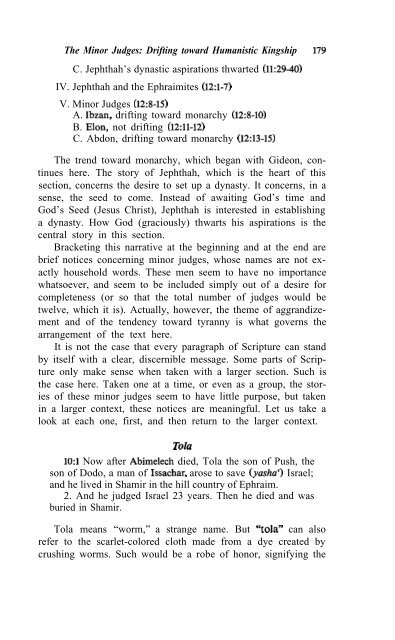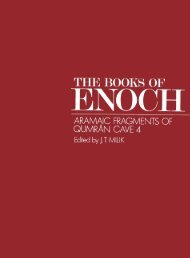- Page 2 and 3:
JUDGES: God’s War Against Humanis
- Page 4 and 5:
TO my mother Sarah Burrell Jordan
- Page 6 and 7:
INTRODUCTION One of the best ways t
- Page 8 and 9:
Introduction xi written these stori
- Page 10 and 11:
Introduction . . . X111 Do the five
- Page 12 and 13:
Introduction xv creation in Noah. T
- Page 14 and 15:
Introduction xvii masterpieces. Fai
- Page 16 and 17:
Introduction xix subordinates when
- Page 18 and 19:
Introduction xxi Reformed Theologic
- Page 20 and 21:
2 Judges 2. And the LORD said, ‘J
- Page 22 and 23:
4 Judges Bezek, and fought against
- Page 24 and 25:
The Conquest of l-Iebron 9. And aft
- Page 26 and 27:
8 Judges Caleb have the pick of the
- Page 28 and 29:
10 Judges Blessings for the Kenites
- Page 30 and 31:
12 Judges ment against those who ha
- Page 32 and 33:
14 Judges In order to drive this po
- Page 34 and 35:
16 Judges (Gen. 48:17ff.), came to
- Page 36 and 37:
18 Judges times called “suzeraint
- Page 38 and 39:
20 Judges is sad and striking to no
- Page 40 and 41:
22 Judges It is clear that this Ang
- Page 42 and 43:
24 Judges history of Gideon, which
- Page 44 and 45:
26 Judges shall be as frontlet band
- Page 46 and 47:
28 Judges the Lord has done. If the
- Page 48 and 49:
30 Judges God during the Conquest:
- Page 50 and 51:
32 Judges priests for the Lord. In
- Page 52 and 53:
34 Judges text calls attention to G
- Page 54 and 55:
36 Judges ised fertility to Israel
- Page 56 and 57:
38 Judges as Nature. God has not gi
- Page 58 and 59:
40 Judges Isaiah and Jeremiah. The
- Page 60 and 61:
42 Judges gods. In their distress,
- Page 62 and 63:
4-4 Judges Israel war are the same
- Page 64 and 65:
46 Judges A second application from
- Page 66 and 67:
48 Judges were anointed directly by
- Page 68 and 69:
50 Judges assembly of the rulers, t
- Page 70 and 71:
52 Judges A similar argument is fou
- Page 72 and 73:
54 Judges Asherah was a slightly di
- Page 74 and 75:
56 Judges fifties, hundreds, and th
- Page 76 and 77:
58 Judges 14. And the sons of Israe
- Page 78 and 79:
60 Judges Sodom, but the people lac
- Page 80 and 81:
62 Judges to be quiet so that he co
- Page 82 and 83:
64 Judges justice.” Hemy is corre
- Page 84 and 85:
66 Judges that before the Fall, exc
- Page 86 and 87:
68 Judges oppressed Israel totally
- Page 88 and 89:
70 Judges number arrived at (by Div
- Page 90 and 91:
72 Judges Canaan Resurgent 4:1. The
- Page 92 and 93:
74 Judges Why the nine, though? It
- Page 94 and 95:
76 Judges early 1960s. As presented
- Page 96 and 97:
78 Judges liturgical role in worshi
- Page 98 and 99:
80 Judges Barak ’s Response and G
- Page 100 and 101:
82 Judges 15. And the LORD routed S
- Page 102 and 103:
84 Judges strong position for defen
- Page 104 and 105:
86 Judges Satan and the woman takes
- Page 106 and 107:
88 Judges The background of this co
- Page 108 and 109:
90 Judges false names and with fake
- Page 110 and 111:
92 Judges In Canaanite mythology, o
- Page 112 and 113:
94 Judges 3a. Hear, O kings; Give e
- Page 114 and 115:
96 Judges every manslayer to flee t
- Page 116 and 117:
98 Judges consider the fact that De
- Page 118 and 119:
100 13. 14a. 14b. 15a. 15b. 16a. 16
- Page 120 and 121:
102 Judges From their courses they
- Page 122 and 123:
104 Judges Meroz must have been in
- Page 124 and 125:
106 Judges would give an equivalent
- Page 126 and 127:
108 Judges This contrast has been d
- Page 128 and 129:
7 GIDEON: GOD’S WAR AGAINST BAAL
- Page 130 and 131:
Gideon: Go&s War Against Baal 113 D
- Page 132 and 133:
Gideon: God% War Against Baal 115 d
- Page 134 and 135:
Gideon: God% War Against Baal 117 1
- Page 136 and 137:
Gideon: Go&s War Against Baal 119 t
- Page 138 and 139:
Gideon: God’s War Against Baa! 12
- Page 140 and 141:
Gideon: God3 War Against Baal 123 L
- Page 142 and 143:
Gideon: God’.. War Against Baal 1
- Page 144 and 145:
Gideon: God% War Against Baal 127 h
- Page 146 and 147: Gideon: God’s War Against Baa[ 12
- Page 148 and 149: Gideon: God’.. War Against Baal 1
- Page 150 and 151: Gideon: Go&s War Against Baal 133 5
- Page 152 and 153: Gideon: Go#s War Against Baal 135 G
- Page 154 and 155: Gideon: Go&s War Against Baa! 137 P
- Page 156 and 157: Gideon: Go&J War Against Baal ture.
- Page 158 and 159: Gideon: Go#s War Against Baal 141 i
- Page 160 and 161: Gideon: God!s War Against Baal 143
- Page 162 and 163: Gideon: God3 War Against Baal 145 1
- Page 164 and 165: Gideon: God’s War Against Baal 14
- Page 166 and 167: Gideon: GOSS War Against Baal 149 t
- Page 168 and 169: Gideon: God!s War Against Baal 151
- Page 170 and 171: 8 ABIMELECH: ISRAEL’S FIRST KING
- Page 172 and 173: Abimelech: Israel’s First King 15
- Page 174 and 175: Abimelech: Israel’s First King 15
- Page 176 and 177: Abimelech: Israel% First King 159 a
- Page 178 and 179: Abimelech: Israel’s First King 16
- Page 180 and 181: Abimelech: Israel% First King 163 t
- Page 182 and 183: Abimelech: Israel’s First King 16
- Page 184 and 185: Abimelech: Israells First King 16
- Page 186 and 187: Abimelech: Israe~s First King 169 a
- Page 188 and 189: Abimeiech: Israe~s First King 171 w
- Page 190 and 191: Abiinelech: Israel’sFirst King 17
- Page 192 and 193: Abimelech: Israel% First King 175 l
- Page 194 and 195: 9 THE MINOR JUDGES: DRIFTING TOWARD
- Page 198 and 199: The Minor Judges: Drifting toward H
- Page 200 and 201: The Minor Judges: Drifting toward H
- Page 202 and 203: The Minor Judges: Drifting toward H
- Page 204 and 205: 188 Judges B. The Origin of Jephtha
- Page 206 and 207: 190 Judges From Judges 18:7 and 28
- Page 208 and 209: 192 Judges tragedy more often than
- Page 210 and 211: 194 Judges have a respect for herit
- Page 212 and 213: 1% Judges was a continuing sign to
- Page 214 and 215: 198 Judges 23. “ ‘Since now the
- Page 216 and 217: 200 Judges sons of Ammon. 30. And J
- Page 218 and 219: 202 Judges hears that God will kill
- Page 220 and 221: 204 Judges the enemy and delivered
- Page 222 and 223: 206 Judges Jephthah’s mourning is
- Page 224 and 225: 208 Judges virginity because she is
- Page 226 and 227: 210 Judges a willing substitute cou
- Page 228 and 229: 212 Judges and note that English wo
- Page 230 and 231: 214 Judges ble state, a human kings
- Page 232 and 233: 216 Judges only God’s judge, but
- Page 234 and 235: 218 Judges 2:23f. In Revelation, 42
- Page 236 and 237: 12 SAMSON THE NAZIRITE (Judges 13)
- Page 238 and 239: Samson the Nazirite 223 defilement.
- Page 240 and 241: Samson the Nazirite 225 We remember
- Page 242 and 243: Samson the Nazirite 227 to please h
- Page 244 and 245: Samson the Nazirite 229 The followi
- Page 246 and 247:
Samson the Nazirite 231 how to rais
- Page 248 and 249:
Samson the Nazirite 233 father. Man
- Page 250 and 251:
Samson the Nazirite 235 lined the c
- Page 252 and 253:
Samson the Nazirite 237 We are told
- Page 254 and 255:
Samson the Nazirite 239 destruction
- Page 256 and 257:
13 SAMSON: THE MIGHTY BRIDEGROOM (J
- Page 258 and 259:
Samson: The Mighty Bridegroom 243 f
- Page 260 and 261:
Samson: The Mighty Bridegroom 245 t
- Page 262 and 263:
Samson: i%e Mighty Bridegroom 247 w
- Page 264 and 265:
Samson: The Mighty Bridegroom 249 w
- Page 266 and 267:
Samson: The Mighty Bridegroom 251 t
- Page 268 and 269:
Samson: The Mighty Bridegroom 253 T
- Page 270 and 271:
Samson: The Mighty Bridegroom 255 w
- Page 272 and 273:
Samson: The Mighty Bridegroom 257 a
- Page 274 and 275:
Samson: The Mighty Bridegroom 259 t
- Page 276 and 277:
Samson: The Mighty Bridegroom 261 T
- Page 278 and 279:
Samson: The Mighty Bridegroom 263 a
- Page 280 and 281:
266 Judges 8 “In the fuxt cycle,
- Page 282 and 283:
268 Judges The men of Gaza did not
- Page 284 and 285:
270 Judges They want to afiiict him
- Page 286 and 287:
272 Judges And he awoke from his sl
- Page 288 and 289:
274 Judges that is the return of hi
- Page 290 and 291:
276 Judges lords were killed, destr
- Page 292 and 293:
Is THE LEVITES’ FAILURE: RELIGIOU
- Page 294 and 295:
The Levites’Failure: Religious Ap
- Page 296 and 297:
The Levites’Failure: Religious Ap
- Page 298 and 299:
The Levites’Failure: Religious Ap
- Page 300 and 301:
The Levites’Failure: Religious Ap
- Page 302 and 303:
The Levites’Failure: Religious Ap
- Page 304 and 305:
16 THE LEVITES’ F~URE: MORAL DEPR
- Page 306 and 307:
The Levites’Failure: Moral Deprav
- Page 308 and 309:
The Levites’Failure: Moral Deprav
- Page 310 and 311:
The Levites’Failure: Mora[Depravi
- Page 312 and 313:
The Levites’Failure: Moral Deprav
- Page 314 and 315:
The Levites’Failure: Moral Deprav
- Page 316 and 317:
17 THE DESTRUCTION OF BENJAMIN (Jud
- Page 318 and 319:
The Destruction of Benjamin 305 Ben
- Page 320 and 321:
The Destruction of Benjamin 307 23.
- Page 322 and 323:
The Destruction of Benjamin 309 Ben
- Page 324 and 325:
The Destruction of Benjamin 311 41.
- Page 326 and 327:
The Destruction of Benjamin 313 ser
- Page 328 and 329:
THE SALVATION OF BENJAMIN (Judges 2
- Page 330 and 331:
The Sa[vation of Benjamin 317 used
- Page 332 and 333:
The Salvation of Benjamin 319 3. An
- Page 334 and 335:
The Salvation of Benjamin 321 on pa
- Page 336 and 337:
The Salvation of Benjamin 323 tive
- Page 338 and 339:
The Salvation of Benjamin 325 “da
- Page 340 and 341:
The Salvation of Benjamin 327 A fin
- Page 342 and 343:
THE POLEMIC AGAINST KINGSHIP IN JUD
- Page 344 and 345:
Afterword 331 this study, it was th
- Page 346 and 347:
Afterword 333 context of Judges sho

















